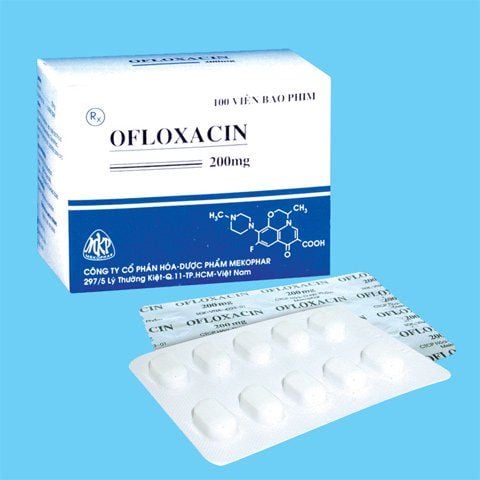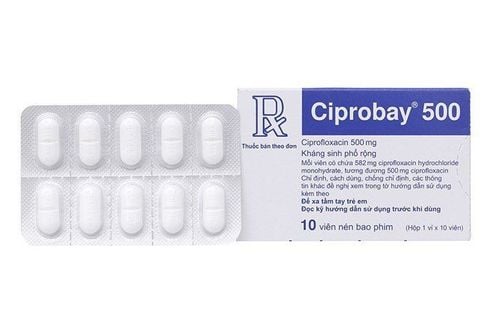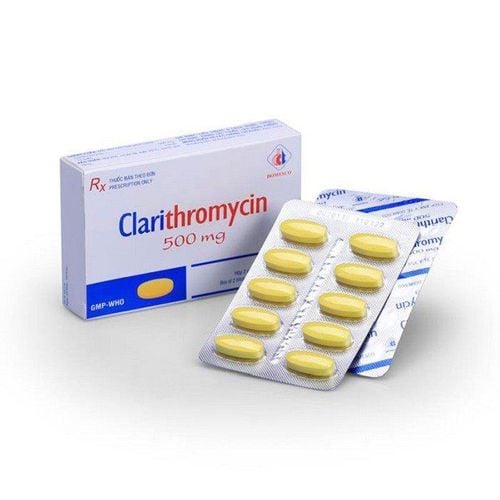This is an automatically translated article.
Amerimentin is indicated for the treatment of skin and soft tissue infections, gastrointestinal infections and other common infections. So how is Amerimentin used? The following article will provide more information about the effects and precautions when using this drug.1. What is Amerimentin?
Amerimentin medicine contains Amoxicillin (as Amoxicillin trihydrate) 500mg, Clavulanic acid (as Potassium Clavulanate) 125mg and excipients just enough provided by the manufacturer. The drug is prepared in the form of film-coated tablets, packaged in a box of 2 blisters, each blister of 5 tablets.2. What does Amerimentin do?
Amerimentin is indicated for the treatment of infections caused by susceptible bacteria such as: Upper respiratory tract infections (including ear - nose - throat): tonsillitis, sinusitis, otitis media. Lower respiratory tract infections: Acute exacerbation of bronchopneumonia. Genitourinary tract infections: Cystitis, urethritis, nephritis and pyelonephritis. Skin and skin structure infections: Infected wounds, boils, abscesses. Gastrointestinal infections. Bone and joint infections: Osteomyelitis, arthritis. Dental infections: Gingivitis, alveolar inflammation. Other common infections such as: abortion, infection in obstetrics and gynecology, infection in the abdomen. In addition to the effects of Amerimentin, there are some contraindications to using this drug for patients as follows:Allergy to active ingredient Amoxicillin, Clavulanic acid or other excipients in the composition of the drug. Allergy to beta-lactam drugs (such as penicillins and cephalosporins). Patients with a history of jaundice or liver dysfunction caused by the use of Amoxicillin and Clavulanate or penicillins and Clavulanic acid are at increased risk of intrahepatic cholestasis.
3. Dosage and how to take Amerimentin
Amerimentin is available in the form of film-coated tablets for oral administration. Swallow the tablet whole, do not chew, break or crush the tablet before taking as it may reduce the absorption of the drug.Below is the recommended dose of Amerimentin:
Adults and children over 12 years old:
Dosage for this group of subjects is 1 tablet / time, 2 times a day. Do not take Amerimentin for longer than 14 days unless advised by your doctor. The above dosage is only the recommended dose, the treating doctor will depend on the condition of each patient to prescribe the appropriate dose.
4. Amerimentin side effects
Before prescribing, doctors always weigh the benefits of Amerimentin's effectiveness against the possible risks to the patient while taking the drug. However, some cases when using Amerimentin may still occur undesirable effects as follows:At normal doses, undesirable effects are expressed in more than 5% of patients taking Amerimentin. Most common with gastrointestinal reactions such as diarrhea, nausea, vomiting. The incidence of this reaction increases with higher doses and is more common than with amoxicillin alone. Common side effects include diarrhea, rash, pruritus, eosinophilia, nausea, vomiting, hepatitis and cholestatic jaundice, increased transaminases. Occasionally, severe reactions such as anaphylaxis, hemolytic anemia, pseudomembranous colitis, Stevens-Johnson syndrome, interstitial nephritis, toxic epidermal necrolysis have also occurred. In the course of taking the drug, when the patient encounters the above undesirable effects or any symptoms, immediately notify the doctor for advice and appropriate intervention.
5. Amerimentin drug interactions
In order to avoid interactions when taking a combination of drugs, patients should tell their doctor about all the medicines they are taking, including prescription drugs, non-prescription drugs, dietary supplements, herbs, etc. ...The following are some drugs that have the potential to interact with Amerimentin when used in combination as follows:
Amerimentin can cause prolonged bleeding and clotting time. Therefore, care should be taken in patients taking a combination of anticoagulants. Similar to antibiotics with a broad spectrum of action, drugs can reduce the effectiveness of
6. Some notes when using Amerimentin drug
Here are some notes when taking Amerimentin to help achieve its effectiveness as well as reduce the risk of side effects for patients:The drug should not be used in pregnant women, unless necessary according to the doctor's instructions. prescription of the treating physician. Amerimentin can be used during breast-feeding, because it has no harmful effects on the infant, except for the risk of sensitization due to small amounts of the drug after oral administration in breast milk. Patients with impaired liver function: Common symptoms of cholestatic jaundice rarely occur with the drug but can be severe. However, such symptoms are usually reversible and resolve after 6 weeks of stopping treatment with this drug. For patients with renal failure, the dose should be based on the degree of moderate or severe renal impairment to be appropriate for the patient. Patients with a history of hypersensitivity to penicillins may be at risk of severe or fatal reactions. For patients taking Amoxicillin with erythema and lymphadenopathy, prolonged use of Amerimentin sometimes leads to the development of resistant bacteria. When an overdose occurs, because it is well tolerated even at high doses, the drug rarely causes harmful complications for patients. However, in general, the occurrence of acute reactions depends on the hypersensitivity of the individual. There is a risk of hyperkalemia when very high doses are taken with Clavulanic acid administered as the potassium salt. Dialysis can be used to remove drugs from the circulation. Above is the important information of Amerimentin, carefully reading the instructions before use and strictly following the doctor's instructions will help the drug achieve the desired effect and safety for the patient.
Please dial HOTLINE for more information or register for an appointment HERE. Download MyVinmec app to make appointments faster and to manage your bookings easily.













